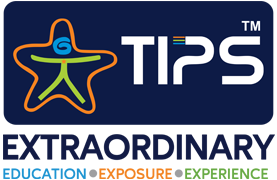- Blog By
Ms. Sumita Sen Mazumdar
Editor – Content & Academic Coordinator – KG
The Indian Public School
August 18, 2020 | In Blog 
Every child is unique in their own way and deserves utmost care and guidance to bring out the best in them. TIPS kindergarten understands that young learners need carefully constructed learning environments to stimulate their minds. Early learning at TIPS preschool campus is a holistic process integrating the principles of IB, Waldorf and Montessori. We cater to the different developmental needs of every child to ensure both cognitive and physical progress. We encourage children to explore their environment and learn about their world through a hands-on approach that creates stronger pathways to the brain. Supportive interactions with trained teachers guide them on their play & learn journey through preschool.
The Indian Public School Kindergarten Experience
Our superior blended curriculum, handpicked facilitators and outstanding modern infrastructure deliver a quality learning experience from play group to upper KG.

Taking from Montessori we include EPL (Exercises of Practical Life) activities, sensorial learning, mathematics, language, geography & science. From IB we include inquiry-based learning which challenges children to think for themselves so that they can become independent learners, as well as free & guided play. From Waldorf we have incorporated elements such as imaginative play, storytelling, music & movement.
Montessori EPL includes lessons on activities of daily living. Everyday living skills activities are important to teach children to function in their own home environment and find their place in their world and culture. Practical life exercises include pouring, sorting, food preparation, care of self (hand washing, dressing oneself), care of the environment (table setting, sweeping), and grace and courtesy lessons (saying excuse me, introducing oneself). Children refine their fine motor skills through repetition of practical life exercises. Practical life activities build children’s concentration, coordination, order and independence enabling them to master other Montessori curriculum areas. Children love the practical life area because it enables them to do adult work in a child-sized environment. With more and more success comes greater confidence, giving them the internal foundation to believe in themselves with the realisation that they can conquer any task through repetition and perseverance. The concentration children develop through using practical life works will aid in future skills and success in other areas of the Montessori curriculum such as sensorial learning, language, math and culture.
Sensorial learning includes materials to help children develop and refine their senses using cylinder blocks, pink tower, broad stair, colour tablets, etc. The Montessori sensorial curriculum promotes the development and refinement of the five senses. Children learn through their senses and all materials in a Montessori environment provide learning through touch, taste, smell, sight, hearing or hands-on manipulation. Some examples of sensorial learning activities are sorting objects, matching colours, matching same tastes or same smells. A popular Montessori sensorial work is the pink tower where pink cubes are built from the largest at the bottom to the smallest cube at the top. Children love to build the pink tower!
Inquiry-based learning includes teaching methods built on students’ individual knowledge and interests, and emphasises learning how to learn and how to find out, using both traditional and contemporary media. Each teacher has the mandate that the learning within their classroom must be engaging, relevant, challenging and significant. Teachers are viewed as facilitators and not ‘distributors’ of knowledge. Here, learning outcomes are transparent and accessible for the entire learning community including parents, students and other teachers. Activities like dramatisations, presentations, science experiments, observations of nature and role plays form part of inquiry-based learning.
Free Play is self directed by the child. It improves imagination and creativity in the child. Safe play areas where children can run, play in sand, build castles and bridges set the base for their learning. Guided Play has a certain level of involvement and guidance from the teacher.
We believe that true motivation for learning comes from inherent interest and joy in the learning process. A child will learn quickly when they are genuinely interested in what is happening around them. At TIPS KG, we take special care in making the process and environment interesting for a young child.

Writing stations, reading nooks, math accessories, nature crafts, a cookery corner and a new splash pool engage children joyfully throughout their school day!
Come visit our KG campus at Erode today!
Also read WHOLE-CHILD APPROACH IN KINDERGARTEN




